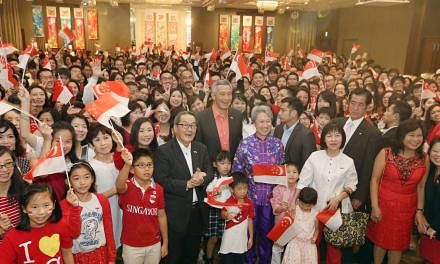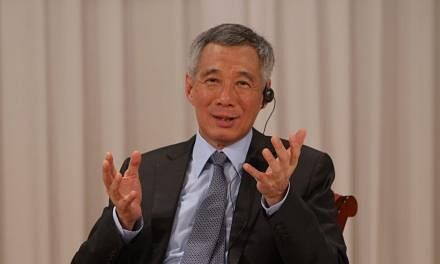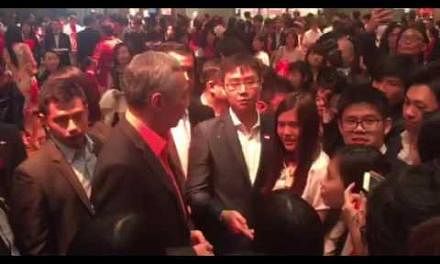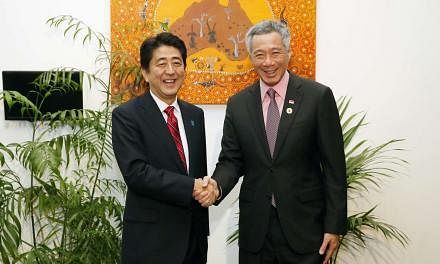TOKYO - The Asia Pacific region is entering a period where there are major geopolitical shifts and difficult internal conditions to navigate, Prime Minister Lee Hsien Loong said on Thursday (Sept 29).
"Countries can only succeed in this challenging environment by strengthening our cooperation, and not by turning inward," he said in a speech to over 500 people at a special session of the Nikkei conference in Tokyo.
PM Lee is on a four-day official visit to Tokyo, which ends on Thursday, to mark 50 years of bilateral ties between Singapore and Japan. He was invited to deliver a keynote speech at a special session of the 22nd Nikkei International Conference on The Future Of Asia, held by Japanese publisher Nikkei.
He noted that in many economies, "protectionist, anti-immigrant, anti-globalisation sentiments are prevalent". But Asia is "not doing badly" compared to the rest of the world.
"The European Union faces fundamental problems ranging from refugees to Euroscepticism and Brexit, while the United States is in the midst of a troubled and untypical Presidential election," he said, adding that terrorism is also a problem for many countries.
But Asia has its own issues, he said, devoting a large part of his speech to shifting regional dynamics.
China's rise a plus
PM Lee stressed that China's rise is overall "a huge plus for the world", and its success and growing inter-dependence with other countries have contributed greatly to the prosperity of Asia and the world.
But its rise "requires every country to make major adjustments", PM Lee said. "This calls for restraint and wisdom from all sides."
China has itself had to adjust to this new role, and take on new responsibilities as an emerging major power, he said. This is evident from its growing contributions to United Nations peacekeeping operations, and Beijing's early ratification of the Paris Agreement on climate change.
But at the same time, PM Lee said: "China should be mindful of the natural unease and apprehension that its rapid rise elicits in its neighbours and other powers.
"It should act in such a way as to demonstrate that it is committed to building win-win relationships with other countries, and that while it seeks to revise existing frameworks and rules, it is not about to overturn the established international order which it has itself benefited from."
For smaller countries, like Singapore, they will need to "take the policies and interests of an emerging major player into our calculations", he said, though there are also benefits in the new opportunities for trade and economic cooperation with China.
Other major powers, meanwhile, should "accommodate the legitimate interests of a growing China", as it strives for more influence over global developments.
"It will increase its contributions to international cooperation, in accordance with its capabilities and resources, and in the hope of having more say at institutions such as the UN, IMF (International Monetary Fund) and World Bank," PM Lee said. "These aspirations need to be recognised, and given due weight and consideration by the other powers."
Against this context, "we have to expect frictions and disputes from time to time, especially between neighbours, because each country has its own national interests.
"It is thus not surprising that China is involved in territorial and maritime disputes in the South China Sea and the East China Sea," he said.
"But all sides have a vested interest in reaching a new and workable balance, and in minimising conflict. For if countries fail to work together, we are not just losing opportunities to prosper together, but are also putting at serious risk all that we have achieved so far."
This applies to China itself which, despite its size, is not self-sufficient.
Meanwhile, China's rise "has not been, and will not be, completely smooth", he said, given the "pressing" challenges of, among other things, the low wage, export-driven model of growth reaching its limits and growing demands to improve public services.
But it is in the world's interests that China succeed, PM Lee added. "A stable and prosperous China conscious of its weight and responsibilities, moving forward on a path of 'Peaceful Development', will greatly benefit the Asia-Pacific, and bode well for the world."
Japan has role to play
Against this backdrop, Japan also has an important role to play, PM Lee said, as he offered three suggestions in how Japan should "evolve" to continue making valuable contributions.
First, while Japan has embarked on its "Abenomics" economic policy, he urged "Japan to take bolder moves, because more needs to be done" to overcome its "deep-seated economic challenges".
He noted that structural reforms are underway, including reforms to the foreign labour policy, to encourage women into the workforce and to liberalise and modernise the agricultural sector.
In line with this, Japan as a "much more homogeneous society than the US", needs to maintain an outward orientation. This could be done by making "a greater effort to expose its people to the world, and especially the young".
PM Lee noted that while Ivy League colleges in the US used to take in more Japanese students, they have been surpassed in numbers by Korean and Chinese students - and Korea has less than half the population of Japan.
"If more young Japanese can be exposed to study abroad with the best and brightest from around the world, and then come back to be integrated back into Japanese society and economy, bringing with them different perspectives and approaches, this can only enrich and invigorate Japan," he said. "This is what Japan did in the Meiji Restoration."
Yet another avenue to strengthen this outward orientation is through the 12-nation Trans-Pacific Partnership (TPP) agreement, he said, adding that China should be welcomed to eventually join the pact, as it is a "pathway towards free trade in the Asia Pacific".
Second, PM Lee said he hopes Japan will have stable and peaceful relations with its neighbours and big powers, China and the US.
Noting that he was glad Japan has made progress with South Korea on the comfort women issue, he added: "With China, Japan's relationship is more complicated, because the wounds of war have not completely healed."
While both countries still have differences - including the territorial dispute over the Senkaku/Diaoyu islands in the East China Sea - PM Lee said: "But I hope both countries will work together to manage the disputes and also to pursue opportunities, and not see the relationship as a zero-sum game."
PM Lee, in characterising the Japan-China relationship as "simultaneously cooperative but also competitive", said he welcomed the recent meeting between Chinese President Xi Jinping and Japanese Prime Minister Shinzo Abe at the Group of 20 (G-20) Summit in Hangzhou.
"If both China and Japan work hard at it and avoid mishaps, both will save themselves a lot of problems, and the region will heave an enormous collective sigh of relief," he said.
PM Lee also said he hopes Japan will maintain its strong links with the US, with the US-Japan Security Alliance being the "cornerstone of regional stability because it anchors the US in the region, and restrains countries in North-east Asia from escalating their disputes".
This is where the TPP is strategically important, as it provides an avenue for "shared and growing economic interest and partnership" between the US and Japan.
Lastly, PM Lee said he hopes Japan will continue to play an "active and constructive role" in Asia, especially South-east Asia, through avenues like the TPP and the Regional Comprehensive Economic Partnership (RCEP), as well as the East Asia Summit (EAS) and Asia-Pacific Economic Cooperation (Apec) fora.
Noting that "key players" like Japan influence the tone for the region, he urged Japan to continue playing its constructive role in promoting peace, stability and development in the region.















